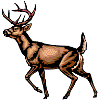Eastern Wildlife Damage Control Conferences

Eastern Wildlife Damage Control Conference: 6th (1993)
Date of this Version
October 1993
Document Type
Article
Abstract
The Cooperative Animal Damage Control program in New Hampshire has received increasing requests for assistance over the past 5 years. This trend is due largely to changing public concern over black bears (Ursus americanus) in residential areas and an epizootic of the Mid-Atlantic strain of rabies in raccoons (Procyon lotor). A growing number of requests is related to improper garbage storage and feeding of songbirds during late spring and summer. Some traditional methods, especially livetrapping and relocation, are not generally appropriate to resolve these conflicts. In this paper we discuss trends in requests for assistance from 1988 to 1992 and innovative strategies that emphasize better cooperation among agencies and human behavior modification to address the source of the problem.

